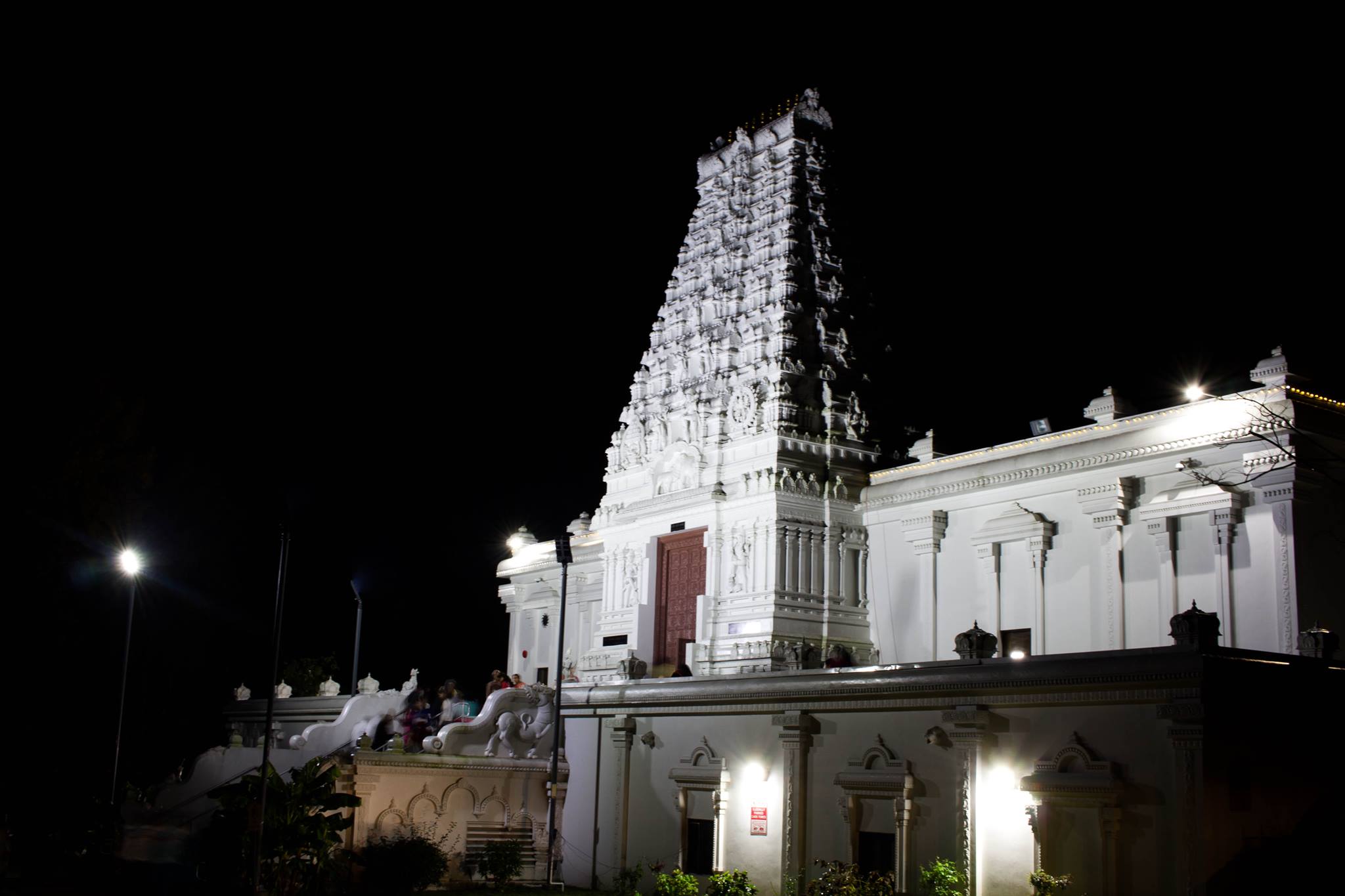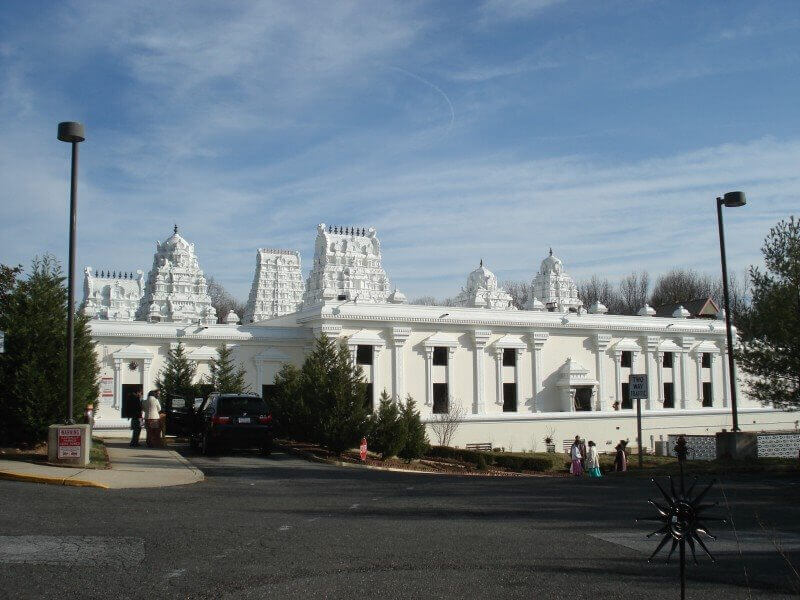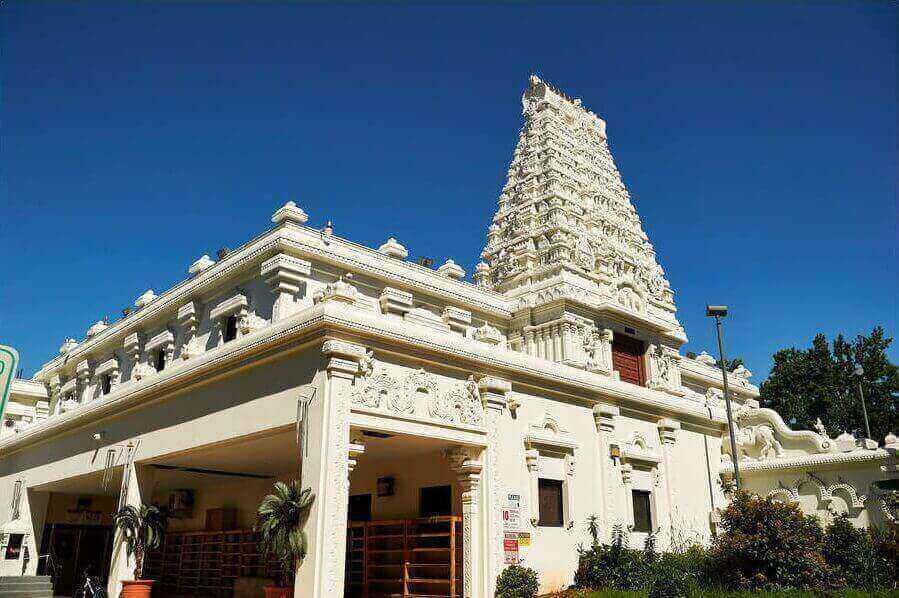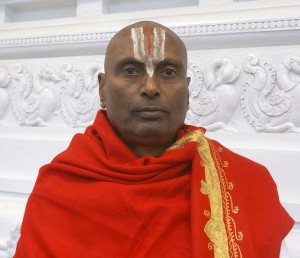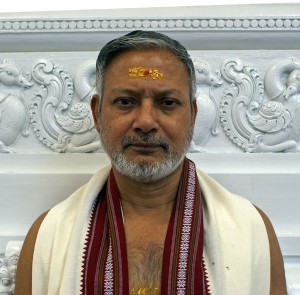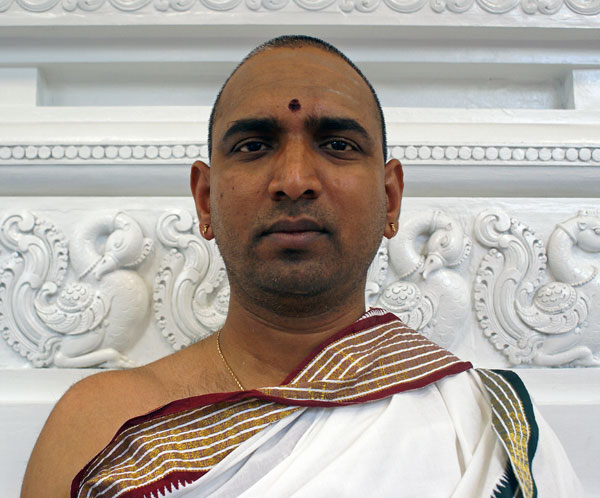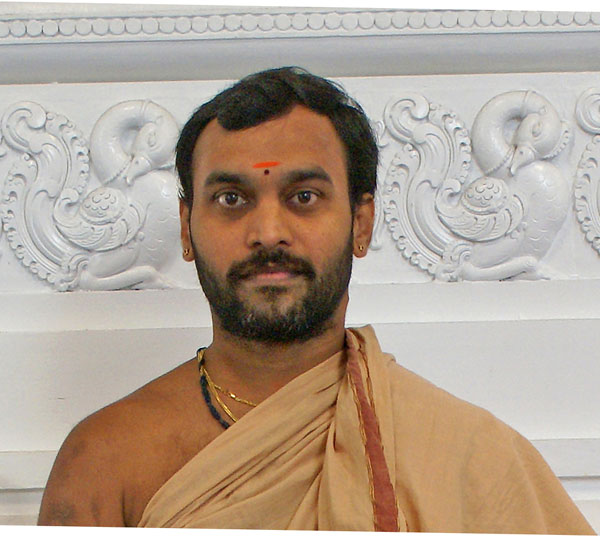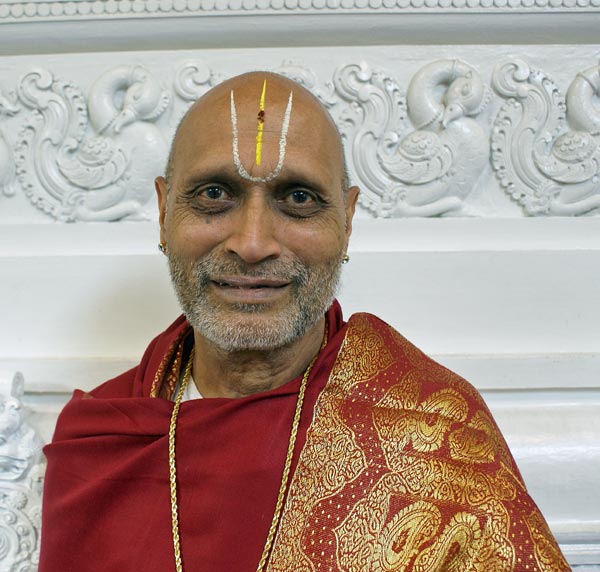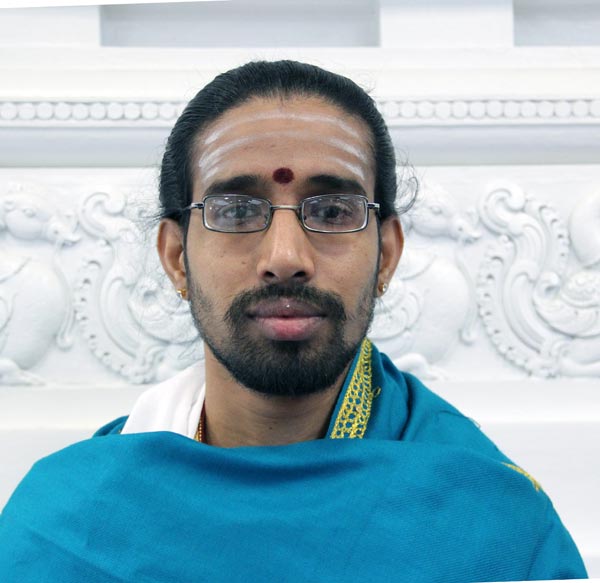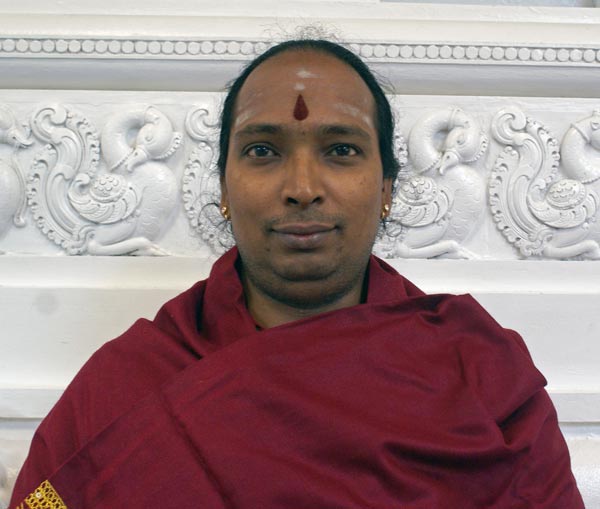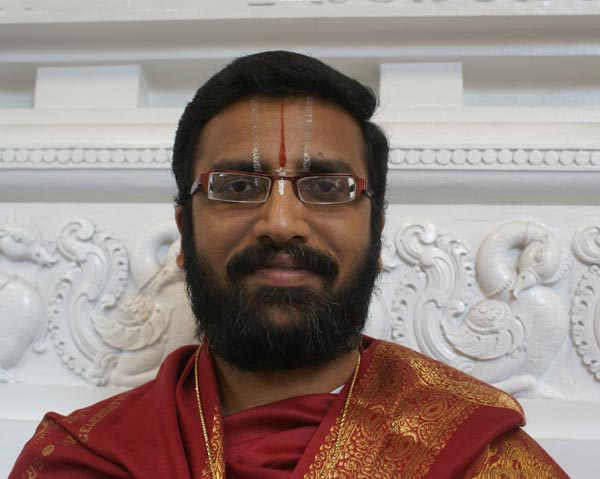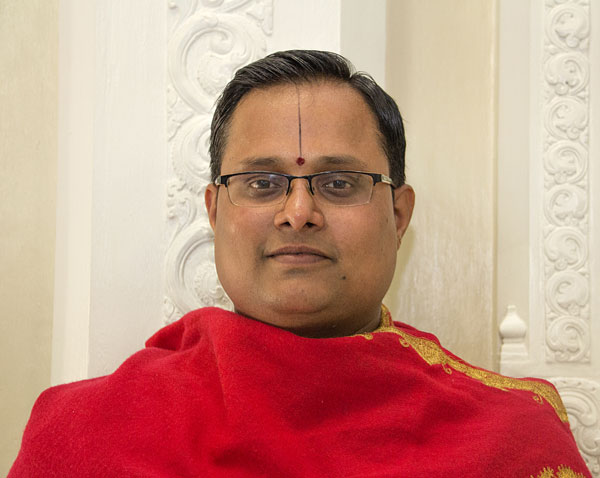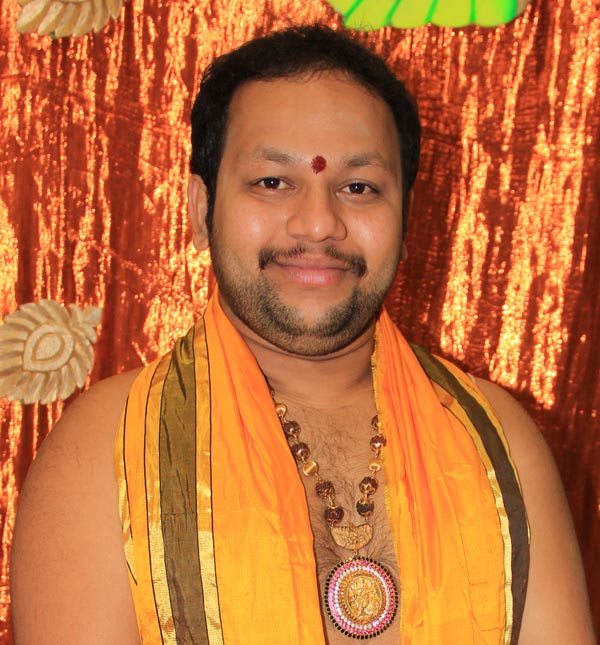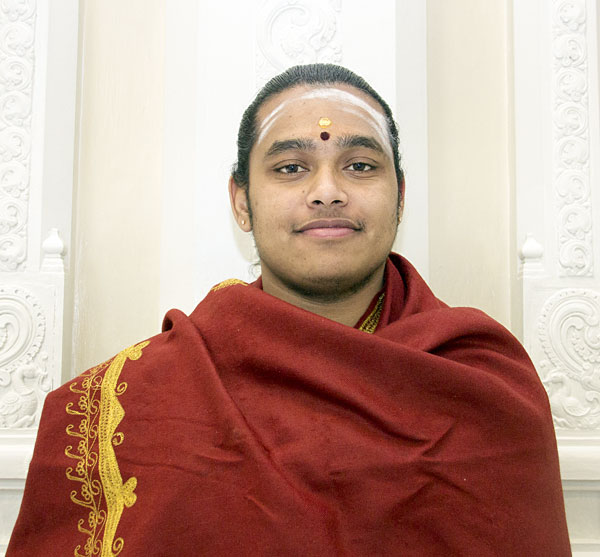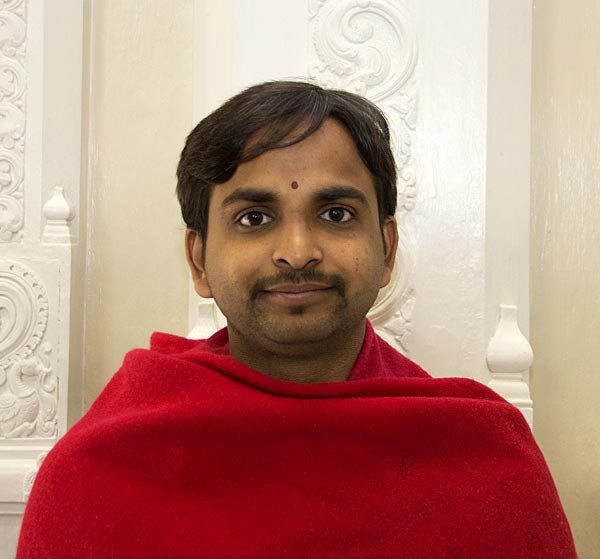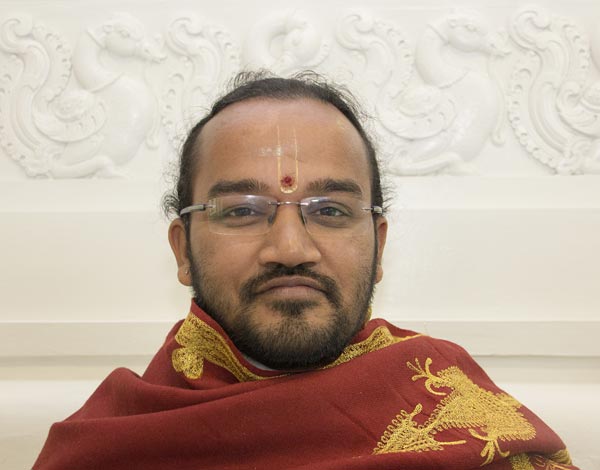About
General Information
The Sri Siva Vishnu Temple, located in Lanham, Maryland is about 12 miles from Washington D.C. What started off as a very small idea, in the living rooms of a few devotees in the late seventies, has now blossomed into being one of the largest temples in the western hemisphere. The actual temple construction began in 1988 and has incorporated the Mayan, Pallava, Vijayanagara, Kerala and the South Canara styles of temple architecture.
The Temple houses several Sannidhis with several deities which were consecrated between the years of 1990 and 2002. The last deity consecrated was in 2002, and they were all re-consecrated during the Jeernodharana Kumbhabhishekam in 2003.
Temple Hours (The Temple is open on all Important Holidays)
| Days | Timings |
|---|---|
| Weekdays | 9 am – 1 pm 5 pm – 9 pm |
| Weekends/Holidays | 9 am – 9 pm |
Weekly Puja Schedule
| Puja | Timings |
|---|---|
| Temple Opening & Suprabhaatam | 9 am Mon-Fri |
| Abhishekam | 9.30 am Daily |
| Evening Arathi | 6.30 pm Daily |
__PRESENT
__PRESENT__PRESENT
1980
The seed for the idea that a Hindu temple should be built in the nation’s capital was planted in 1976 among a few friends. By 1980, that idea had been nurtured and shared with others, and the Sri Siva Vishnu Temple Trust was formed. Its goals seemed fitting for immigrants thousands of miles from their ancestral home: to unite Hindus in America, individuals diverse in their customs but unified in their devotion and values, and to offer a place where Hindu culture could thrive among immigrants, their children and their children’s children.
1984
In 1984, the SSVT Trust acquired a plot of land with a small house in suburban Washington. This house was the Balalaya, where the shrines were initially installed. As more people began to share in the vision for a grand temple of traditional architecture and sculpture, plans were drawn up, with the blessings of the Shankaracharyas, under the direction of eminent temple architect Dr. Ganapati Sthapati.
1990
1400 people witnessed in 1990 the consecration and installation of the first shrines in the temple building we see today.
1991
In 1991, the Temple held its first Kumbabhishekam, as shrines for several deities were built and consecrated. Over the years, SSVT adapted to the growing needs of the congregation, acquiring more land and adding shrines for Venkateshwara and Ayyappa.
2002
In 2002 the Mahakumbabiskem ushered in the majestic Rajagopuram and the spacious Vasantha Mandapam. In July 2003, the new gopurams for Venkateswara and Ayyappa were completed. In addition, the temple has a auditorium for concerts, dance performances and other special events, a large dining hall to meet the devotees needs and 2 homakundams, a large one for Temple Homams and a smaller one for personal Homams. Both the auditorium and the dining hall can be rented out for weddings and other personal functions.
At Present
Today, the Temple is the enterprise of dedicated volunteers, administrative staff and eleven priests, and the symbol of a community’s joint aspirations and efforts.
__PRESENT
__PRESENT__PRESENT
Vision
Sri Siva Vishnu Temple began with the concept of bringing Hindus together, but increasingly it has become a place that brings together Hindu customs and heritage with American values of community and volunteerism. In a new millennium, it will be a symbol of the Hindu community in America.
SSVT’s commitment to this future is already in evidence. In 1997, it launched the Children’s Fund in an effort to develop youth and education programs and meet the needs of a fast-growing Hindu population in Washington. In 1998, SSVT is developing a new initiative on community service and volunteerism, focusing on Hindu families as well as the broader community.
As the Hindu community has grown, its needs have diversified, and increasingly, more families need help in dealing with illness, coping with grief, mentoring young people and assisting seniors. SSVT will draw on its greatest resource — its volunteers — to tackle some of these new problems. In a new project with other like-minded groups, SSVT volunteers in Mitra Mandala, or Circle of Friends, will provide a compassionate ear to those in need and assist them in obtaining relief from service organizations in the area.
SSVT will undertake service projects beyond the Hindu community, offering help through local charities such as soup kitchens and shelters. Youth will play an important role in this effort to fully embrace the needs of the Hindu community and its role in the community at large: Just as SSVT began in 1976 in the minds of a few recent immigrants from India, its future lies in the hands of younger generation and its vision for a Hindu community in America.
__PRESENT
__PRESENT__PRESENT
The original Sri Siva Vishnu Temple Bylaws were enacted in 1993 and were amended once in 1999. The Bylaws underwent a major rewrite during a Constitution Committee process and was enacted on October 9, 2011. Subsequent clarifying amendments were ratified in December 2013 and on December 20, 2014. As part of a decennial review process, the current Bylaws were reviewed and ratified by the General Council on July 24, 2021. The next Temple Bylaws Review and approval is planned for 2031.
Bylaws of the Sri Siva Vishnu Temple
Whereas the Sri Siva Vishnu Temple Trust (Religious Trust) has been created under the Deed of Trust dated January 31, 1980, in the State of Maryland, and the Trustees have been vested with the powers under the common law and statutory and other powers granted under the Declaration of Trust to administer the properties of the Trust, and
Whereas the Sri Siva Vishnu Temple Trust has been recognized as a tax-exempt religious Trust by the Internal Revenue Service under the ID # 52-1179969 dated June 06. 1980.
Consistent with their vested responsibilities, the Board of Trustees has unanimously adopted these bylaws to promote the objectives of the Trust and maintain the operations of the Sri Siva Vishnu Temple (SSVT) in the service of the Hindu congregation.
1. The Congregation
All followers of the Hindu faith and worshippers who subscribe to the objectives of the Temple embodied in the Deed of Trust and accept the obligations of the Deed of Trust constitute the congregation of the Temple.
2. The Governance Structure
The SSVT governance structure will consist of: (a) a General Council (GC); (b) a Governance Board (GB); and (c) a Board of Trustees (BOT). The membership, roles, and responsibilities of these three bodies are further described in the sections that follow and the SSVT Deed of Trust, Bylaws, and any amendments thereto.
3. General Council (GC)
(A) Membership
- All current trustees of the BOT and Trustees Emeriti (TE) will serve as members of the GC.
- Upon invitation of the President of the GB (in consultation with the Chairperson of the BOT), the following person may also serve as members of the GC:
- Donors who have contributed in excess of the minimum threshold fixed by the BOT for SSVT designated donor recognition programs. The BOT will set the minimum threshold upon introduction of any new Donor Recognition Program. New donors of the SSVT designated donor recognition programs will become eligible two years after the designated programs are closed. At present, donors who have contributed at least $10,000 for two completed SSVT donor recognition programs (known as Founder Donor Recognition Program and Rajagopuram Donor Recognition Program) as well as any SSVT Capital Fund Donation program set up by the BOT, qualify for GC membership.
- Legators are persons who have contributed at least $50,000 to SSVT Endowment over any rolling 5-year period and will also qualify for GC membership.
- Past coordinators of the devotee committees that are represented on the Operations Committee.
- An invitation to become a GC member will be sent by the President of the GB to those who qualify for the GC and a timely acceptance of this invitation is necessary before being inducted into the GC. Periodic reaffirmation of membership will be sought based on active participation in GC matters. The GB Secretary will maintain a full list of GC members and the list will be displayed on the SSVT website. New GC members will be inducted annually to coincide with the induction of new BOT Trustees in January.
(B) Functions
- GC as representatives of the stakeholders of SSVT will provide guidance to the Governance Board and BOT on all matters relating to strategic direction, governance, and accountability. GC will also provide “advice and consent” to the BOT for: (a) any proposed changes to the Bylaws or Deed of Trust, including amended Bylaws and amended Deed of Trust; (b) for any proposed borrowing by SSVT more than certain limits set in Article 12 (1) and use of funds from SSVT Endowment as described in Article 12 (2); (c) or for issues that may arise in interactions between the GB and BOT.
- GC will be vested with the powers to remove any member of the General Council, Governance Board, and/or BOT (including an Officer of the Trust), as deemed necessary for acts or omissions to act which in the opinion of the General Council are prejudicial to the interests of SSVT Trust. Only TE members of GC will determine disciplinary matters and vote on the removal of any member of the GC, GB, and/or BOT (including an Officer of the Trust). A removal of any member of the GC, GB, and/or BOT (including an Officer of the Trust) must be based upon an affirmative vote of 75% of the TE members of the GC casting secret ballots at a meeting that has a quorum requirement of 50% of the TE members of the GC. While the GB may authorize voting by proxy, proxies shall not be permitted regarding disciplinary actions. A virtual meeting with video presence is an acceptable substitute for in-person attendance. A person directly affected by a disciplinary action may not vote on such action. A removed person may not serve on the GC, GB, or the BOT.
- GC (excluding the BOT members) will appoint the four TE members of the Governance Board using a nomination process that includes the identification of one or more lists of candidates, and an election process as described below. One of the four TE members will be selected by the GB as the President of the GB, who will also serve as the President of the GC.
- The GB will nominate the same TE members as those serving on the Nominations for the BOT described in Section 4(B)1 to propose a list to fill vacancies on the GB. After the announcement of the list, any other GC member with the support of a seconder, can propose a different list within 1 week of the scheduled balloting. Nominations from the floor are not allowed for this ballot in which only the GC members who are not currently on the BOT may participate, with a quorum requirement of 25% of the TE members of the GC present either in person or by proxy as may be permitted by GB as provided in Article 3. (B). (2). The GB vacancies will be filled by the list garnering the most votes cast by secret ballot.
(C) Meetings
- The GC will have a mandatory meeting annually to receive a report from BOT on the results of the fiscal year just concluded and to discuss matters relating to the Trust’s operations. In addition, the GC will have one meeting annually focused on the strategic direction of SSVT and guests may be invited to this meeting at the discretion of the President of the GB.
- The GC may be convened any other time at the request of either one third of the members of the BOT, or by a minimum of three members of the Governance Board, or by 10% of the members of the GC to discuss specific items of strategic importance. A meeting so convened will also announce whether proxy voting will be permitted.
- The GC shall be chaired by the President of the GB.
4. Governance Board
(A) Membership
- The Governance Board (GB) will consist of four TE serving a two-year term, current Chairperson of the BOT, and two members appointed by the BOT for a one-year term. GB will be chaired by the President who is selected or elected as prescribed under the appropriate procedures.
- The TE elected to serve on the GB, by the GC will be selected for service of two-year terms. Those TE who have served on the GB may be selected for additional terms after a five-year gap between each term of service.
- The GB will be chaired by a President. The President must be one of the four TE members of the GB. The seven members of the GB shall choose and appoint, or elect, the President from the pool of four TE members. The seven members of the GB shall choose and appoint, or elect, the Secretary of the GB of the pool of six remaining GB members (seven GB members minus GB President). The GB Secretary will: a) coordinate meeting with the BOT; b) maintain minutes of the GB and GC meetings; c) keep an up-to-date roster of GC membership.
(B) Functions
- Nominations for BOT vacancies:
The GB will appoint a Nominations Committee and will instruct it to focus on finding candidates who are likely to meet specific needs of the BOT or contribute to effecting inter-generational transition. Additionally, the GB will include in its instructions guidance regarding types of candidates to be avoided to prevent exposure of SSVT to conflicts of interest. The Nominations Committee will nominate members for any BOT vacancies. The Nominations Committee members are appointed by the GB and will be three TE members from the GC, and two members of the BOT. The Chair of the Nominations Committee is also selected by the GB and must be one of the TE members. Nominations Committee members cannot serve consecutive years.
- Financial Oversight:
The GB will exercise its financial oversight function as follows:
- The GB will appoint an Audit Committee consisting of three members. The mandate will be specified in a charter approved by the GB and BOT as described in Article 11. The Audit Committee will report to the GB.
- The GB has the responsibility to consider, and authority regarding approval, of any new borrowing in excess of $500,000 in any fiscal year.
- Dispute Resolution and Grievance Redressal – Office of the Ombudsperson:
- The GB shall create and supervise an Office of the Ombudsperson and appoint one person to serve a two-year term, with the option to continue for another year.
- Additionally, the GB shall have the option, at its sole discretion, to appoint special Ombudspersons for a limited, specific time not to exceed 6 (six) months to address a particular issue, dispute, or complaint.
- Purpose: An Ombudsperson is to act as a mediator to receive, review, investigate, address, and resolve disputes or complaints that cannot be resolved through normal Temple channels. Operational issues are intended to be resolved first through the manager(s), responsible officer(s), devotee committees and/or the BOT. This Office does not make final decisions on issues, disputes, or complaints, but shall make best efforts to effect amicable resolutions of these. The Office of Ombudsperson shall operate pursuant to the Dispute Resolution Procedures of the Temple.
- Confidentiality: All communications to and from, and all efforts at mediating disputes and/or complaints by the Office of Ombudsperson shall be kept strictly confidential.
- Qualifications: Ombudspersons generally: (1) have an understanding of the Hindu faith; (2) have an understanding of SSVT, particularly its history, religious practices, commitment to community welfare, culture, and congregation; and (3) be persons considered trustworthy and held in the highest esteem by the congregation.
- The following would not be suitable as Ombudspersons: Presently serving members of the Board of Trustees, the Governance Board, Officers, Employees, Committee Members, or any person who would have a conflict of interest in mediating an issue, dispute, or complaint. If any serving Ombudsperson has a conflict of interest, such a person shall not serve in that particular mediation. If no Ombudsperson can serve in a mediation, then the Governance Board shall appoint a special Ombudsperson as per 3) b above.
- General
- The GB shall work to assure that:
- The Board of Trustees publishes Protocols and Etiquettes for the Congregation defining Internal and External Stakeholders and periodically updates it
- Access to the Temple and its services shall be provided to all.
- The GB shall work to assure that:
- No member of the public shall be excluded from participating in worship on account of their caste, race, gender, national origin, age, marital status, sexual orientation, or disability.
- Purity of the ritual shall be maintained as far as possible and circumstances permit.
- The Temple shall provide a peaceful environment that is non-discriminatory and free from all forms of physical, sexual, and psychological abuse, including written or verbal intimidation or harassment.
(C) Authority
- The GB will have the authority to independently collect information regarding SSVT operations, governance, and functioning when needed.
- The GB will have the authority, when needed, to draw independent inferences regarding progress towards SSVT’s objectives and take actions through its functions of appointing a Nominations Committee, Audit Committee, etc.
- The GB will have the authority, when needed, to continually assess the borrowing needs of SSVT and collaborate with the BOT in any approvals as described in Section 12(1).
(D) Meeting
- The GB will meet at least once every quarter with the BOT and will regularly receive and review BOT minutes and financial reports. The GB will receive minutes of all BOT proceedings in a timely manner.
- All decisions of the GB will normally be taken based on consensus. If consensus is not reached, all members of the GB will vote on issues using electronic communications and/or remote participation. Under exigent circumstances, the vote may be held with a quorum of five out of seven members and with an affirmative vote from a minimum of 5 members.
5. Board of Trustees (BOT)
- The BOT shall compromise a minimum of nine and a maximum of 17 trustees. Upon the retirement or removal of a Trustee, the BOT may induct new Trustees from the congregation in accordance with the provisions of Bylaws and in recognition of exemplary volunteer service to SSVT. The term “Trustee” in this section signifies a trustee serving on the BOT at a given time.
- The BOT will determine the number of persons serving as Trustees depending upon the circumstances and requirements of the Sri Siva Vishnu Temple Trust to sustain the religious objectives of the Trust and to maintain the services to the congregation.
- The responsibility and authority for final decisions on all matters will remain with the BOT, except that on matters relating to specific functions of the GC and GB as provided in Articles 3 and 4 respectively of these Bylaws, the BOT will need to consult or obtain approval as appropriate prior to making final decisions.
6. Composition of the Board of Trustees
Guiding Principles:
- The BOT is the authority to induct new Trustees under the articles of incorporation of the Trust. In the induction of new Trustees, the considerations will include one or more of the following: (1) Trustees shall maintain utmost confidentiality of BOT discussions, correspondence, and meetings; (2) that the nominee is familiar with the modes of worship in the shrines of the SSVT; (3) the nominee possesses professional expertise directly necessary for the volunteer activities as a Trustee in the management of the operations of the Trust and Temple; (4) institutional memory will be served; (5) continuity in professional expertise required for temple operations and management will be maintained; (6) in order that the privilege and the opportunity of volunteered dedicated service to the Temple are accessible to active devotees, spouses of serving Trustees or both spouses will not be identified for induction as new Trustees for the same term; and (7) every effort will be made to ensure that the BOT is broadly representative of the Temple’s congregation, in particular the women and younger members thereof.
- The BOT will be guided by these principles in determining the number of trustees on the BOT:
- The term of office of Trustee will be three years. After completion of one term, trustees are eligible for re-nomination as Trustees for a second term; a Trustee will be eligible for future terms after an interval of at least one year.
- Induction of New Trustees: Each year, GB will establish the date for nominations to the Board of Trustees and appoint a Nominations The Nominations Committee [refer to Section 4(B)1] will propose a list of nominees in conformity with the principles and requirements set forth in the Bylaws and Trustee Nomination Guidelines document provided by the GB. The BOT will make the final identification of new inductees from among the nominees provided by the Nominations Committee and invite them to serve on the BOT. The proceedings and nominees of the Nominations Committee will be kept confidential.
7. Committees established by the Board of Trustees
The BOT may establish appropriate Committees and delegate specific administrative functions and powers consistent with the objectives stated in the Deed of Trust for the maintenance of the activities of the Temple to meet the needs of the congregation. The composition and functioning of the Committees, including guidelines relating to such matters as the quorum for meetings of the Committees, will be based on guidelines and policies approved by the BOT. The BOT may from time to time change the number of Committees and their scope of operations as necessary. Committees should reflect the diversity of the temple congregation in all ways; no member shall be excluded on the account of their caste, race, gender, national origin, age, marital status, sexual orientation, or disability.
8. Operations Manual, Personnel Manual, Policy Guide and Other Guidelines
- The BOT shall maintain and approve an Operations Manual which describes the functions of the Temple and guides the interactions among the BOT, Executive Committee, various Administrative and Devotee Committees, and Task Forces established for the smooth operation of the Temple.
- The BOT shall prepare and maintain an up-to-date Personnel Handbook which summarizes the conditions of employment of all categories of full time and part time employees of the Temple.
- The BOT shall maintain an up-to-date Policy Guide which codifies all policy decisions and operational guidelines which will guide the Officers and management of the Temple.
- The GB shall issue guidelines on procedures to be followed in the selection of new Trustees and selection of Officers. These guidelines and other Governance documents prepared on relations with stakeholders shall be posted on the SSVT website, along with the Bylaws, and a current list of GC members (names only). The documents described will be reviewed annually and revised as necessary.
9. Officers of the Trust
- The President of the GB and one retiring trustee (or if no trustee is retiring, a trustee who has declared they are not interested in an Officer position) nominated by the BOT Chairperson will together propose candidates for each Officer position after informally ascertaining the preference of all Trustees in being part of the EC. Following the guidelines for Officer Selection provided by the GB, the BOT will then proceed to appoint Officers of the Trust by secret ballot voting, conducted under the supervision of the President of the GB.
- The Officers of the Trust will function in accordance with the following provisions: all officers will serve for one year from the first day of January to the last day of December of the year and will be eligible for re-appointment for one more consecutive term. The officers of the Trust are: the Chairperson; two Vice Chairpersons (one as Vice Chairperson of Human Resources (HR) & Policy and the other as Vice Chairperson of Operations); the Treasurer; and the Secretary.
- The Officers of the Trust directly report to the BOT and will follow the guidelines and policies established by the BOT. The final authority for decisions rests with the BOT, except as otherwise as stated by the Bylaws for the GC and GB.
- The Officers of the Trust will form the Executive Committee (EC), which will provide the leadership of the Trust and will address issue(s) relevant to the functioning and growth of the Temple as specified in a delegation of authority from the BOT which may be revised from time to time, as needed by the BOT. In an emergency, the Officers will take action in consultation with as many Trustees as are available, at least remotely. Annually, the Officers will file certificates with the authorities as required by the First Amendment to the Deed of Trust.
- The Chairperson will preside over all meetings of the BOT. The duties and responsibilities of the Chairperson will be to implement the resolutions and decisions of the BOT in conformity with the articles of declaration in the Deed of Trust and the Bylaws. The Chairperson will be an ex-officio member of all Committees established by the BOT. The Chairperson will be the official spokesperson of the Trust for all outside contacts.
- A Vice Chairperson, designated by the BOT, will perform the duties of the Chairperson in the absence of the Chairperson. In the event the Chairperson and both Vice Chairpersons are absent, the BOT will choose one BOT member to lead the monthly meeting. Subject to overall supervision by the Executive committee, one of the Vice Chairpersons will coordinate the activities relating to HR and Policy, and the other Vice Chairperson will coordinate all activities relating to daily Temple operations.
- All officers will serve no more than two consecutive years in the same position.
- The BOT shall appoint a Trustee, with requisite education and experience in financial matters, to serve as the Treasurer, to serve for a period of one year. The Treasurer may be assisted by Assistant Treasurer(s) as needed. The Treasurer will:
- Be responsible for the recording of receipts, disbursements and safekeeping of all funds belonging to the trust.
- Operate in conformity with policy guidelines established by the BOT.
- Submit all accounts of transactions and report on the financial condition of the Trust to the BOT on a regular basis.
- Be responsible for having the account and financial statements of the Trust audited by duly appointed external auditors for accounts and transactions during his/her term of office.
- Be responsible for ensuring the completion of the external audit of the financial statements within 365 days of the end of the fiscal year as required by the laws of the State of Maryland. The audited financial statements should be made available to the General Council before its annual meeting.
- Be responsible for presenting the annual budget for approval by the BOT and for providing periodic financial information to the BOT, Audit and Finance Committees.
- The BOT shall appoint a Trustee to serve as the Secretary for one year with the responsibility to keep records and maintain the minutes of BOT meetings, and to coordinate the activities relating to BOT meetings. The Secretary will maintain a record of policy decisions of the BOT and update the Policy Guide regularly.
- All meetings, including correspondence and communications handled by the Officers will be available to the BOT for review at least by the following BOT meeting. All official correspondence of the SSVT Trust will be done with the official Sri Siva Vishnu Temple logo on the letterhead.
10. Meetings of the Board of Trustees
- The BOT will meet at least once each month in-person and/or remotely. BOT meetings will be called by the Chairperson, or by the Secretary acting on the behalf of the Chairperson. Notice of the meeting time and place will be given to Trustees by mail, electronically, or by telephone at least one week prior to the meeting. In addition, a special meeting of the BOT may be called by the Chairperson or by at least three Trustees giving written notice at least one week in advance for non-emergency matters stating the specific agenda items for the special meeting. Quorum for a meeting will be the majority of the Trustees serving on the BOT at the time.
- A trustee who fails to attend three consecutive meetings of the BOT in any calendar year without the approval of the BOT is deemed to have vacated the position of trustee, and the BOT may choose in consultation with the GB whether or not to fill the vacancy. If it is decided that the vacancy would be filled, the procedures outlined in Article 6 shall be followed.
- Decisions of the BOT
- Decisions on matters relating to the Deed of Trust, Bylaws, and any amendments thereto will be taken by BOT only after obtaining the advice and consent of the GC.
- Policy decisions other than those mentioned in Article 10(3) a. above will normally be taken on the basis of consensus; if consensus cannot be established in two meetings of the BOT, a decision will require an affirmative vote of 75% of the Trustees serving on the BOT at the time; decisions on the induction of new Trustees from among the list produced by the Nominations Committee, in accordance with Article 6, will be on this basis.
- All other operational decisions of the BOT will be on the basis of consensus of Trustees attending the meetings of the BOT, subject to quorum requirements. If consensus of the Trustees present at the meeting is not established, an affirmative vote of 75% of those Trustees present at the meeting will constitute a decision.
- The BOT may discipline a BOT member, including an Officer of the Trust, in accordance with its broad authority in the Deed of Trust; subject to the conditions that: (i) discipline will not include removal of a BOT member, which authority is vested solely in the GC; and (ii) such action is supported by 75% of trustees serving at the time.
11. Audit Committee
- An Audit Committee consisting of three members, with two members who have requisite financial and accounting qualifications, and a member of the Board of Trustees, who is not an officer of the Temple, will be constituted by the Governance Board. Members of the Audit Committee are appointed for an initial period of two years and may serve for a total of three years, if so, appointed by the Governance Board. The committee will be chaired by a member who is not a member of the current Board of Trustees. The mandate of the Audit Committee will include oversight of financial reporting, external and internal audits, internal controls, and compliance with applicable laws and regulations.
- Internal Audit:
The BOT, in consultation with the Audit Committee, will adopt a charter that outlines the functions of an internal auditor. The Audit Committee will appoint an internal auditor in accordance with the charter. The internal auditor will be appointed for a period of two years which may be extended by one more year by the Audit Committee.
12. Finance Committee
The Board of Trustees will establish a Finance Committee consisting of a minimum of five members and a maximum of nine members including two members of the Board of Trustees, all with the requisite knowledge and understanding of financial matters. The Finance Committee will be chaired by the current Treasurer. The Functions of the Finance Committee shall include: a) review of operating and capital budgets; b) review the fundraising of capital projects; c) oversight and management of endowment resources; d) developing policies for financial capital projects, borrowing, and establishing limits on borrowing.
- Borrowing of the Temple
Any new borrowing by the temple in excess of $500,000 in any fiscal year will require the recommendation of the Finance Committee, and approval of the Board of Trustees and the Governance Board. Any new borrowing in excess of the temple’s debt ceiling, set at $1.5 million (excluding purchase of houses and contiguous land) will additionally require approval by the General Council.
- Use of Resources in the SSVT Endowment
Resources of the Trust that have been designated to be used for the SSVT Endowment shall be managed under the oversight of the Finance Committee in accordance with approved policies for the endowment. The corpus is to remain untouched. Annual income less the direct expenses generated by the endowment can only be used for purposes designated in the Endowment policies under the direction of the Board of Trustees. Any use of the corpus of the endowment must be extraordinary and will require approval by a super majority (75%) of the General Council under the following: a quorum of 50% of the GC membership; proxy voting is permitted.
- Use of Annual Surplus
Within 120 days of the end of each fiscal year, upon the recommendation of the Finance Committee, the Board of Trustees will allocate the operating surplus for the previous fiscal year between the operating account, capital account, and endowment.
13. Advisory Committees
The BOT may appoint, from among the trustees, or from among the congregation, outside of the BOT, one or more advisory committees to help address specific issues. The participants of these advisory committees will serve in consonance and approval of the BOT.
14. Resolving Ambiguity
- If a conflict arises in the interpretation of the Bylaws, the ambiguity shall be resolved by an affirmative vote of at least five members of the GB.
- In all matters which are not specifically mentioned in these Bylaws, the rules contained in Robert’s Rule of Order Revised shall govern the SSVT.
Appendix
Trustee Nomination Guidelines
One of the main drivers in the nominations process (both from the perspective of the nominations committee and the BOT) is to, as far as possible, have unanimous acceptance from all members of the Nominations Committee as well as BOT members and to discourage any lobbying for the BOT vacancy.
The details below are therefore based on the premise that selection will be unanimous in the new trustee nomination process.
Pre-Nomination
- The GB President communicates in early August with the BOT Chairperson to understand the number of trustees completing their 3-year term (who could be renominated) and number of trustees completing 6-year term (who will need to be replaced.)
- Also in August, the Chair communicates to GB President the needs and composition of the Board. This is to guide the Nominations Committee (NC) to look for candidates with a specific background – accounting/finance, engineering, religious, cultural, educational knowledge, gender, regional balance, and any others deemed appropriate by the BOT. At this time, the VC of Operations will communicate with all committee members that the trustee nomination process has commenced, and if they have any candidates for nomination, to channel them through a GC member.
- The GB (all 7 members) will discuss and approve the formation of the NC. The NC will be comprised of three TEs from GC and two trustees nominated by the BOT Chairperson, for a total of five NC members. The GB will select the NC Chairperson from among the three TE members. Ideally, this is also completed in August.
Names to Nominations Committee
- A pseudo email box (for example nominationsYYYY@ssvt.org) is created, where names of candidates for trustee nominations will be sent by GC members.
- In September, the GB President will send an email to the GC with the following information:
- The number of trustees required to be nominated and BOT background requirements for new trustees
- Provides a deadline for submission of trustee names (typically 2 weeks). A reminder email will be sent after 1 week by the GB President.
- Instruct GC members to email/submit candidate names to the pseudo email box (see above).
- The pseudo email ID and temporary password will be provided to the NC Chairperson. The NC Chairperson will change the password and monitor all email traffic for new trustee nominations being submitted by GC members. All members of the NC will have access to all emails.
- The NC Chairperson will schedule a NC meeting one week after the deadline for nominations by GC.
Nominations Committee Discussion
- During deliberations, NC members will first decide (at least four out of five members should agree) whether existing trustees who are completing their first 3-year term should be renominated to the BOT. The renomination of these existing Trustees for their second term should not be automatic, but based on contributions in the first term and the current -needs of the BOT. However, if a trustee is rejected by the NC for renomination, the matter should be handled with caution and discretion.
- Next, NC members will decide (at least four out of five members should agree) the names of new trustees that are being proposed to the BOT, based on the needs of the BOT, composition of the full BOT (as described under Pre-Nomination, #2 section above), as well as gender and regional representation (if required).
BOT Approval of New Trustees
- The BOT Chairperson notifies the BOT, GB President, and NC Chair of a Special Board meeting date and time, where the names will be brought to the BOT for trustee selection. This will occur by the end of October
- At this Special Board meeting, the GB President will start the meeting off describing the constitutional responsibility of the GB, NC, and request the BOT to strive for consensus in the selection of new trustee names being proposed by the NC.
- The NC Chairperson will review the process followed by the NC, names of the committee members (in confidence with the BOT), and the thought process in presenting the names.
- Next, the NC Chairperson will present the names of existing Trustees completing their first 3-year term. The NC Chairperson will present the NC preference (renomination or new names) for each Trustee. NC Chairperson will request the process and agreement to be unanimous. The BOT should present rigorous reasoning if the BOT rejects a trustee up for renomination.
- Next, after discussion with the BOT on their background requests (see Pre-Nomination, #2 section above), the NC Chairperson will present the names of new trustees, one-by-one, and provide their background, how they fit in the context of BOT needs, what expertise they bring the temple/BOT. Again, the NC Chairperson will emphasize the need for unanimous acceptance of the name/s of new trustees. The BOT should present rigorous reasoning should they reject a new trustee name presented.
- If required, the BOT has the option to conduct a ballot-based tally in voicing their acceptance or rejection of each proposed new trustee candidate. The threshold for a new trustee to be accepted/approved for selection must be above 75% (e.g., 13 out of 17 trustees must say Yes).
- For those trustees who are not able to be present in-person or virtually at the Special Board meeting, the GB President will communicate with them before or during the meeting and individually present the renominations of trustees completing their first 3-year term, as well as names of new trustees for vacant positions. The GB President will receive their thoughts and acceptance or rejection. The trustee must provide his or her acceptance or rejection even if the BOT has already surpassed the 75% threshold and accepted the candidate. The results of this communication will be given to the NC Chairperson.
- Prior to the conclusion of the meeting, the NC Chair will communicate the outcome of the selection process to the BOT including the trustees who were able to be present at the meeting.
- Once the Special Board meeting has ended, the BOT Chairperson will communicate with the new trustee candidates on their selection to the BOT for the following year and request them to serve the temple.
- If any candidate(s) is/are rejected based on the 75%+ threshold, then the NC will reconvene to once again go through the process to find another candidate. The BOT Chairperson will call for another Special Board meeting in November with the GB President and NC Chairperson. Rejected candidates will not be brought back for consideration in the same year.
After all required trustee nominations are filled, NC Chairperson will clean-up the pseudo email of all nominations related incoming and responded emails, so no trail is left. Then the email account will be handed back to the BOT or the IT Team in charge of creating and maintaining the email account.
Selection/Election of Officers of BOT Guidelines
- The President of GB and one of the retiring trustees (or if no retiring trustee, a trustee who has declared they are not interested in an Officer position) who is appointed by the Chair, are constituted as polling officers.
- BOT members should express to the polling officers if they do not want to be considered as officers of the Board.
- Informing other board members of your interest in an Officer position is expected. BOT members lobbying externally for the position or making bargains to obtain it is not acceptable. The GB will monitor this and can disqualify a BOT member from participating in the Officer election if this conduct occurs.
- The polling officers will provide the BOT the eligibility of each current BOT of member based on term limits (e.g., if the current treasurer is already completing his/her tenure)
- The Chair will call a special board meeting in-person or virtually for the purpose of the Officer election. This will happen within 2 weeks of the selection of new Trustees for the upcoming year- generally in December. Voting by the BOT will be done in the following order: Chair, VC-Operations, VC-HR & Policy, Treasurer and Secretary.
- BOT members will provide their one choice for each position in a secret ballot provided to the polling officers and each result is announced to the group when reached.
- In the first ballot, a simple majority of trustees is required to be selected. If no one person receives a simple majority, then the top 2 vote getters are voted on in a run-off. In this ballot, whoever gets the majority of votes is selected and the result is announced. If no majority is achieved – a coin toss between the top 2 vote getters will occur.
- The ballot is then issued for the next Officer position until all five positions are filled.
Note: Treasurer position requires a financial background and is the only Officer position which has a specific qualification – as described in the Bylaws.
__PRESENT
__PRESENT__PRESENT
Management
Details of each committee/task force is given below:
Governance Board (GB)
- Smt. Uma Potarazu (Trustee Emeritus)– President
- Sri. Ramaswamy Chandramouli (Trustee Emeritus) – Secretary
- Sri. Prabhakar Thyagarajan (Trustee Emeritus)
- Sri. Vasu Murthy (Trustee Emeritus)
- Sri. Mahesh Kukata (BOT Chair)
- Smt. Raji Ramesh (BOT Rep)
- Sri. Gunda Reddy (BOT Rep)
Board of Trustees (BOT)
Chairperson of the Board of Trustees – Sri Mahesh Kukata
Trustees:
- Sri Bangalore Ravindra
- Sri. Gunda Reddy
- Sri. Haridas Nambiar
- Selvi. Jaishri Shankar
- Sri Krishna Reddy
- Sri Mahesh Kukata
- Sri Manju Shivacharan
- Smt. Nalini Iyer
- Smt. Padma Tipirneni
- Sri Raghuram Tumkur
- Smt. Raji Ramesh
- Sri Ramanathan Narayan
- Sri S.V. Krishnaswamy
- Sri Swaminatha Reddy
- Sri Thenappan Meyyappan
- Sri Vijay Kumar
- Sri Umeshkumar Bangalore
The Executive Committee (EC) of BOT consists of:
- Chairperson – Sri Mahesh Kukata
- Vice Chairperson Operations – Smt. Padma Tipirneni
- Vice Chairperson HR & Policy – Sri S.V. Krishnaswamy
- Treasurer – Sri Thenappan Meyyappan
- Secretary – Smt. Nalini Iyer
SSVT Endowment – Investment Management Committee
Committee Chair: Sri. K.N. Sivasubramanian (docbaby@aol.com)
SSVT Endowment is designed to complement the temple’s income by creating two Funds to secure the temple’s future and support the achievement of its mission. The Education & Culture Fund shall be managed so as to provide financial support for educational, cultural and other efforts consistent with SSVT’s mission to benefit its congregation and the broader Hindu community. The Financial Security and Stability Fund is to provide long-term financial security to the Temple. It shall be managed so as to provide financial support through its earnings for debt relief and for long capital needs of the Temple. The Committee, consisting of the Treasurer, four trustee-emeritus and two independent financial specialists, is a fiduciary committee, and is responsible for monitoring the investment management of the Endowment and ensuring adherence to the investment guidelines and asset allocation strategies approved by the Board of Trustees. The Investment Management Committee will employ one or more investment managers of varying styles and philosophies to attain the Fund’s objectives.
BOT Committees
Finance Committee:
Coordinator: BOT Treasurer – Sri. Thenappan Meyyappan
Finance committee advises Board of Trustees on all financial matters: debt levels, budgeting, congregation loan rates, expense ratios and other management tools. Day-to-day operations are managed by the Accounting Team, which is overseen by the Treasurer.
Accounting Team: Smt. Swathi Chandrasekharan
Tax Deductible donations: Smt. Usha Krishnamurthy
Operations Committee:
Coordinator: Vice Chairperson Operations: Smt. Padma Tipirneni
- Coordinates the day-to-day operations of the temple including scheduling and devotee services.
- Authorized to spend up to $2,500 within budget parameters for operational expenses.
- The Operations Committee coordinates the work of all Devotee committees and Task Forces which are listed below
Cultural Committee:
BOT Liaison: Smt. Nalini Iyer, Coordinator: Smt. Sangeetha Menon
Email: cultural@ssvt.org
- Organizes and conducts dance, music, drama, and other cultural programs under Temple’s auspices.
- Provides a venue for exhibiting the talents of young artistes in the region.
- Assists in raising additional resources for sponsoring artistes from India.
- Oversees the making and selling of audio tapes.
Education Committee:
BOT Liaison: Sri. Subramanyam Jayaraman
Coordinator: Sumitha Ajith
Email: education@ssvt.org
Educate children of Hindu roots about their rich culture & religion
Increase the learning for parents and adults so that they can better teach their children and better represent the Hindu community in interfaith settings
Provide an opportunity for those from non-Indian background to learn about Hindu culture.
Engineering/Facilities Committee:
BOT Liaison/Coordinator – Sri. B.T. Nivas
Provides technical advice on all matters relating to construction, installation, remodeling and maintenance of all temple buildings and grounds
Fund Raising Committee:
Co-chairs – Sri. K.G. Venkatraman (Ramani) and Sri. Gunda Reddy
Information Technology (IT) Committee:
BOT Coordinator: Sri. Haridas Nambiar, IT Coordinator: Sri. Ravikumar Ramachandran
- Develops and implements computer systems and networks to support and automate Temple operations. Implement IT processes in various functional areas, including the phone system and front desk operations, Point of Sale (POS) and payment system, security system, SSVT website, email services including flyers/newsletter/program announcements, employee management (scheduling, time cards, payroll, accounting), audio/video operation and maintenance, temple document archival, and social media.
Prasadam/Kitchen Committee:
BOT Liaison: Sri. Bangalore Ravindra; Coordinator: Sri. Gopi
Deputy Coordinator:
Email: kitchen@ssvt.org
- Provides refreshments during weekends, holidays and special puja days.
- Assists in Temple’s annual bazaar and special fund raising events.
Public Relations Committee:
BOT Liaison: Sri. Swaminatha Reddy, Coordinator: Smt. Geetha Somasundar
Deputy Coordinator: Sri.Badri
Email: pr@ssvt.org
- Provides information on Temple services and programs to the congregation.
- Recruits volunteers to assist in religious, administrative and other special programs.
- Conducts ongoing and special fund raising activities.
- Schedule Front Desk volunteers
Religious Committee:
BOT Liaison: Sri. Raghu Tumkur, Coordinator: Smt Jayanthi Chandramouli
Deputy Coordinator:
Email: religious@ssvt.org
Plans and manages Temple’s religious programs.
Organizes relevant pujas for Hindu religious days and special occasions.
Selects priests specialized in different services to serve the needs of the congregation.
Ensures the cleaning of sarees and dhotis for idols
Maintains inventory of jewelry and other idols-related assets.
Youth & Community Service Committee (Aakaar):
Coordinator: TBD
- Provides a venue to teach Hindu mythology and rituals to children and young adults.
- Involves children and young adults in religious, cultural, and social programs of the Temple.
- Creates opportunities for social services in the larger community.
Task Forces
Decorations Taskforce
Coordinator: Smt. Priya Narayan
- Decorates Temple premises during special pujas and functions.
- Assists with decorations when devotees rent the Temple auditorium for marriages and religious events.
Devotee Database Services Taskforce
Coordinator: Smt. Usha Krishnamurthy
Email:
- Maintains current database of congregation members for mailing newsletters and other promotional materials.
- Prepares congregation lists for fundraising and special events.
- Maintains an account of donations and provides devotees with a report of their contributions for tax filing.
Flowers Taskforce
Coordinator: Smt. Prabhavathy Pippalla
Email: prabharsp@yahoo.com
- Prepares garlands for all deities.
- Estimates flower needs for special pujas.
Garden Taskforce
Coordinator: K.G. Venkatraman
- Plants and maintains flowers in Temple premises
- Supervises workers who take care of Temple grounds.
Insurance Taskforce
Coordinator: K.G. Venkatraman
- Deal with all temple employee insurance benefits, including health, workmen’s compensation and other insurance, ensuring the best pricing, benefits and coverage for all
- Deal with all temple building insurance matters and ensure that the temple’s assets are well protected
Hundi Collection Task Force
Coordinator: Geeta Mani
Collecting, recording and depositing of all temple funds on a routine basis.
Publications Task Force
Coordinator: Sri. Manju Shivacharan
Publishes Temple’s monthly newsletter.
Prepares souvenirs and other special publications.
Releases new or updated versions of religious texts for devotees.
Transportation Task Force
Coordinator:
Sri Angarai Venkat Subramanian
Coordinates and manages devotee transportation and parking during temple special events and weekends.
Please serve your Temple in the committees and task forces that you like.
Vastrams Taskforce
Coordinator: Smt. Prabha Narasimhan
- Procure new vastrams for all religious needs
- Iron deity vastrams
Senior Citizens Group
Coordinator: Sri. Satyendra Verma
Email: seniorcitizensgroup2022@gmail.com
- Conduct periodical meet at temple
- Conduct site vistis to other hindu temples
You can contact the coordinator listed or you can call the Temple at (301) 552-3335 or by e-mail at ssvt@ssvt.org
Architecture
__PRESENT
__PRESENT__PRESENT
General Council Members
| Trustees Emeriti | Donor | Coordinator | Trustee | ||
|---|---|---|---|---|---|
| Ananth Krishnan | Ananth Rao | Ananth Badrinath | Bangalore Ravindra | ||
| Anjana Sriram | Ananth RaoNancherla | Aparna Ramaswamy | Gunda Reddy | ||
| Anu Iyer | Ashwin Ramamuthy | Bharathi Reddy | Haridas Nambiar | ||
| B. K. Radhakrishnan | Bavani Rajagopalan | Bhavani Sivaramakrishnan | Jaishri Shankar | ||
| B. T. Nivas | Ganesh Patil | Kannan Subramanian | Krishna Reddy | ||
| Bangalore Shivacharan | CP Subramanian | Chitra Rajaram | Mahesh Kukata | ||
| Banu Ramakrishnan | Dev Ganesan | Gopal Gopinath | Manju Shivacharan | ||
| Barthi Setty | Dhamu Thamodaran | Hanumanth Vishnuvajjhala | Nalini Iyer | ||
| Bhaskar Ganti | G. Krishnan | Jyotsna Venkat | Padma Tipirneni | ||
| Boggarm Setty | Gita Mani | Madhavan | Raghu Tumkur | ||
| C. K. Dhananjayan | Gopal Potti | Madhuri Tallapragada | Rajashree Sankaranarayanan | ||
| C. R. Nath | J. G. S. Mani | Malini Ivaturi | Ramnathan Narayanan | ||
| Chaitanya Ravi | Jay Sriram | Mukunda Ram | S. V. Krishnaswamy | ||
| Chandra Bappanad | Jyothi Gadde | Narayan Arakoni | Swaminatha Reddy | ||
| Chandrasekaran | K. S. Gokulanathan | Prabha Narasimhan | Thenappan Meyyappan | ||
| Charu Narasimhan | Kalyani Sundararajan | Priya Cherry | Umesh Kumar | ||
| D. Rajagopal | Kempanna Sudhakar | Radha Shivakumar | Vijay Kumar | ||
| Doddanna Rajashekar | Krishna P Jayaraman | Ramesh Godbole | |||
| Girija Vallabhan | Krishnan Kumar | Ramesh Kommuri | |||
| Gundu Rau | Krishnan Ramesh | RavanaSamudram Venkatachalam | |||
| Harihar Singh | Lakshmi Natarajan | Ravi Mittal | |||
| Jayapradha Valluripalli | Leela Krishna | Ravi Prasad | |||
| K.G. Venkatraman (Ramani) | Mani Kiran | Rugminy Gopal | |||
| K.N. Sivasubramanian | N. T. Umamaheswaran | Vijay Veldurthi | |||
| Kanesa Thasan | N.C. Krishnamurthy | Sanyasirao Kalla | |||
| Krishna Bappanad | Karthik Mecheri | R.S. Venkatachalam | |||
| Krishna Murthy, Kaveri | Nalini Pillai | Sham Narula | |||
| Krishnan Suthanthiran | Nallan Ramakrishna | Srinivas Tirumalasetti | |||
| Kuntimaddi Sadananda | Namperumal Sundararajan | Subha Chandar | |||
| Lee Bachu | Nirmala Rao | Sudharshan Gupta | |||
| Leela Mandava | P. Krishnamurthy | Thaila Ramanathan | |||
| M.G. Menon | Pichammal Nagarajan | Uma babu | |||
| Madhu Murthy | R Balakrishnan | Umakant Rajguru | |||
| Meena Krishnan | Raghavan Srinivasan | Uthra Mysore | |||
| Murali Elambilan | Raj Ananthanpillai | Nikhil Kulkarni | |||
| Narayanaswami Subramanian | Raju Chidambaram | Raj Bezawada | |||
| Nirmala Cherukupalle | Ramabhadra Chari | ||||
| Nithya Nagarajan | Sagar Nootheti | ||||
| P. G. Periasamy | Sampath Krishnan | ||||
| Parmesh Dwivedi | Sankaran Nayar | ||||
| Potarazu Krishnarao | Sateesh K Singh | ||||
| Prabhakar Thyagarajan | Shankar Kothakota | ||||
| Prabhavathy Pippalla | Shankar Rachakonda | ||||
| Prakash Hosadurga | Shrinivas Udapi | ||||
| Prasad Kadambi | Shyamsundar Rajan | ||||
| Pria Ganesh | Subha Vinayakom | ||||
| Priya Narayan | Sudhakar Shenoy | ||||
| RajagopalaRao Tripuraneni | Sunitha Trehan | ||||
| Rajan Iyer | Tampil Pankaj | ||||
| Ram Mukunda | Venkata Changanti | ||||
| Ramarao Mysore | Venkata Mattay | ||||
| Ramaswamy Chandramouli | Vijaya Lakshmi Nimmagadda | ||||
| Ramu Potarazu | Vinay Murthy | ||||
| Ravi Narayan | |||||
| S. E. Oonnithan | |||||
| S. Sriramachandran | |||||
| S. V. Acharya | |||||
| Sachidananda Babu | |||||
| Sarada Ashok | |||||
| Sasi Menon | |||||
| Sasikala Chandar | |||||
| Sathya Menon | |||||
| Seetaramayya Nagula | |||||
| Sekharipuram Ramakrishnan | |||||
| Shekar Narasimhan | |||||
| Shobha Prasad | |||||
| Sreekumar Sreedharan | |||||
| Sreenivasa Kumar | |||||
| Sridevi Nayar | |||||
| Subhadra Tallapragda | |||||
| Subramanian Krishnamurthy | |||||
| Subramanyam Jayaraman | |||||
| Suresh Babu | |||||
| Surya Reddy | |||||
| Suryanarayana Siram | |||||
| Thiru Gopal | |||||
| Ubrani Jayaram | |||||
| Uma Potarazu | |||||
| Umesh Shankar | |||||
| Usha Iyer | |||||
| V.P. Chandar | |||||
| Valsala Pal | |||||
| Vasu Murthy | |||||
| Venkat A.R. Subramanian | |||||
| Vijaya Gollumudi | |||||
| Vijaya Reddy | |||||
| VS Raghavan |
__PRESENT
__PRESENT__PRESENT
Job Openings
To apply for a position please email your application with a detailed resume to ssvt@ssvt.org mentioning the position you are applying for.
Position 001: Operations Manager (OM)
Job Description
SSVT is looking for an Operations Manager responsible for day-to-day Temple operations. Duties include but not limited to managing the employees – Priests, other Staff, and Cooks in a cordial & amicable manner. The candidate will be responsible for interacting with the devotees, answer their concerns & take care of their needs. Also responsible for scheduling of priests’ daily assignments for temple activities and devotee services both inside / outside of the temple.
Operations Manager is expected to work a minimum of 40 hours per week over six days per week and be available during all other times when the temple is open. On special religious events, temple may open earlier and close later based on the religious needs.
The candidate must be legally permitted to work in the U.S. and expected to have good interpersonal, communication, and collaboration skills. If interested, please submit your resume to ssvt@ssvt.org. Resume submission deadline is April 9, 2023.
Position 002: Hindu Cook
Job Description
Wanted (1) experienced Hindu cook for the kitchen to prepare “prasadam” under the supervision of a senior religious cook. Must be legally permitted to work in the U.S. Competitive salary based on skills. Contact ssvt@ssvt.org.
Position 003: Kitchen Helper
Job Description
Wanted hourly kitchen helper to assist the cook. Must be legally permitted to work in the U.S. Contact ssvt@ssvt.org.
__PRESENT
__PRESENT__PRESENT
Office of Ombudsman
Ombudsman services may be availed by any member of the SSVT congregation or staff.
Currently serving in the Office of Ombudsman are:
Sri. V.S. Raghavan
Smt. Sasikala Chandar
Email: ssvt@ssvt.org
__PRESENT
__PRESENT__PRESENT


